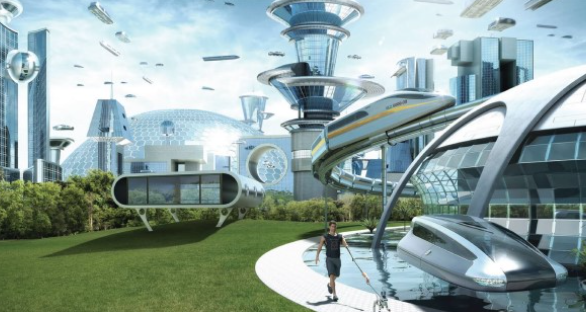Introduction
The world of technology is in a constant state of evolution, pushing the boundaries of what’s possible and shaping the future in unprecedented ways. As we embark on the journey of the 21st century, it’s crucial to look ahead and understand what the future of technology may hold. In this article, we’ll explore some of the exciting developments and innovations expected in the coming decades, offering a glimpse into what the future of technology may have in store for us.
1. Artificial Intelligence (AI) Advancements
Artificial Intelligence (AI) is set to be at the forefront of technological innovation in the coming decades. While AI has already made significant strides in various industries, its potential is far from fully realized. In the future, we can expect AI to revolutionize fields such as healthcare, finance, and manufacturing:
- AI-Enhanced Healthcare: AI will play a pivotal role in healthcare, providing advanced diagnostics, treatment recommendations, and drug discovery. This will lead to personalized medicine, faster disease detection, and improved patient care.
- Autonomous Vehicles: The era of self-driving cars will continue to unfold. These vehicles, equipped with AI-driven systems, will not only make transportation safer and more efficient but also reshape our understanding of mobility. We can anticipate widespread adoption of autonomous vehicles for both personal and commercial use.
- AI-Generated Content: AI algorithms will become increasingly sophisticated in generating written, visual, and audio content. This will impact various industries, from journalism to entertainment, where AI-generated art, music, and literature may become more prevalent. However, it will also raise questions about originality and creativity.
2. Quantum Computing
Quantum computing, with its unparalleled processing power, is a frontier that promises to revolutionize technology in the coming decades. Classical computers, based on binary bits (0s and 1s), are reaching their computational limits. Quantum computers, which use quantum bits or qubits, offer vastly superior processing capabilities. They have the potential to solve complex problems in minutes that would take classical computers years, if not centuries, to tackle.
Quantum computing’s applications span a wide range of fields, including cryptography, materials science, and complex simulations. In cybersecurity, quantum computing poses both a threat and a solution. Quantum computers have the potential to crack many of the encryption methods currently used, which has led to the development of post-quantum cryptography to safeguard sensitive data. Conversely, quantum encryption can provide unbreakable security for communications.
3. Internet of Things (IoT) Expansion
The Internet of Things (IoT) will continue to expand and connect billions of devices, ranging from smart home appliances to industrial sensors. As more devices become interconnected, our world will become more efficient and data-driven. Smart cities will harness IoT to optimize resource usage, transportation, and public services. In agriculture, IoT will enable precision farming, improving crop yields and sustainability. The healthcare sector will see wearable devices and remote monitoring, enhancing patient care and reducing healthcare costs.
However, the proliferation of IoT devices also raises concerns about data privacy and security. As more devices collect and transmit data, the need for robust cybersecurity measures will be paramount.
4. 5G and Beyond
The rollout of 5G networks is already underway and will continue to revolutionize connectivity. 5G offers significantly faster and more reliable wireless communication, enabling innovations in various sectors:
- Augmented and Virtual Reality: 5G’s low latency and high bandwidth will unlock the full potential of augmented reality (AR) and virtual reality (VR). These technologies will see widespread adoption in gaming, education, healthcare, and remote work, offering immersive and interactive experiences.
- Remote Surgery: With the low latency of 5G, surgeons will be able to perform delicate procedures on patients located thousands of miles away. This will improve access to specialized healthcare and potentially save lives in emergency situations.
- Smart Cities: 5G will play a pivotal role in the development of smart cities. It will facilitate real-time data collection and analysis for urban planning, traffic management, and resource allocation.
- Autonomous Drones and Vehicles: 5G networks will be crucial for the real-time communication required for autonomous drones and vehicles to navigate safely and efficiently.
5. Biotechnology Breakthroughs
Biotechnology is poised for significant advancements in the coming decades. Developments such as gene editing and personalized medicine will lead to more effective treatments for diseases and a deeper understanding of human biology.
- Gene Editing: Technologies like CRISPR-Cas9 will continue to evolve, offering the potential to cure genetic diseases and modify genetic traits. This has profound implications for healthcare and may lead to longer and healthier lives.
- Personalized Medicine: Advances in genomics and data analytics will enable the development of treatments tailored to an individual’s genetic makeup. This precision medicine approach will enhance treatment efficacy and reduce side effects.
6. Sustainable Technology
As the world grapples with the challenges of climate change and resource depletion, technology will play a pivotal role in sustainability efforts. Innovations in renewable energy solutions, sustainable manufacturing processes, and waste reduction will be at the forefront of these efforts:
- Renewable Energy: Solar, wind, and other renewable energy sources will continue to grow in capacity and efficiency. Energy storage solutions will become more advanced, addressing the intermittent nature of renewables.
- Green Transportation: Electric vehicles (EVs) will become more affordable and accessible. Sustainable transportation solutions, such as hydrogen fuel cells and EV charging infrastructure, will further reduce carbon emissions.
- Sustainable Agriculture: Technology will enable precision agriculture, minimizing resource use and waste in food production. Vertical farming, aquaponics, and hydroponics will become more widespread.
- Circular Economy: The concept of a circular economy, where products are designed for reuse and recycling, will gain traction. Technology will support the development of closed-loop systems, reducing waste and conserving resources.
7. Space Exploration and Commercialization
The exploration and commercialization of space will continue to advance. Private enterprises like SpaceX and Blue Origin are driving the commercial space race, with goals ranging from lunar colonization to Mars missions. The space industry will create opportunities for new technologies, materials, and economic ventures.
- Space Tourism: The dream of space tourism is becoming a reality. Companies like Virgin Galactic and SpaceX are working on providing commercial space travel experiences for civilians.
- Lunar Colonization: Establishing a human presence on the moon is on the horizon. This endeavor will require advanced life support systems, lunar habitats, and sustainable resource utilization.
- Deep Space Exploration: Missions to Mars and beyond are being planned. The development of spacecraft capable of carrying humans on long-duration missions is a technological challenge that will be met with innovative solutions.
8. Augmented and Virtual Reality
Augmented Reality (AR) and Virtual Reality (VR) will continue to evolve, shaping the way we interact with digital information and the physical world. These technologies will permeate various industries:
- Education: AR and VR will revolutionize education, making learning more interactive and immersive. Students will be able to explore historical events, visit distant countries, or dissect virtual organisms, enhancing their understanding and retention of knowledge.
- Healthcare: Surgeons will use AR and VR to perform complex surgeries with greater precision. Medical training and patient care will benefit from immersive simulations.
- Gaming: The gaming industry will continue to push the boundaries of AR and VR, offering players incredibly realistic and immersive experiences.
- Remote Work: VR technologies will enable remote workers to collaborate in virtual spaces, making remote work more engaging and productive.
9. Cybersecurity Challenges
As technology advances, so do cyber threats. The future will see a constant battle between cybersecurity measures and evolving cyberattacks. With the increasing connectivity of devices through IoT and the critical role of data in the digital age, robust cybersecurity will be a top priority. AI-driven security solutions will become more sophisticated in identifying and mitigating threats.
10. Ethical and Privacy Concerns
With the increasing integration of technology into our lives, ethical and privacy issues will become more prominent. Data privacy, algorithmic bias, and the responsible use of AI will be subjects of ongoing debate and regulation. As technology shapes our society, the ethical considerations surrounding its development and application will play a pivotal role in determining its impact.
11. Education and Skill Development
The rapid pace of technological change means that continuous learning and skill development will be critical for individuals to stay competitive in the job market. Lifelong learning will become the norm, and educational institutions, as well as online platforms, will play a vital role in providing accessible and relevant learning opportunities.
12. Health and Longevity
Technology will play a pivotal role in extending human lifespans. Developments in anti-aging research, regenerative medicine, and healthcare technologies will offer new treatments and interventions that can enhance both the quality and length of human life.
Conclusion: A Future Full of Promise and Challenges
The future of technology is filled with promise, offering solutions to some of humanity’s most pressing challenges while introducing new possibilities. However, it also presents its share of challenges, from ethical concerns to cybersecurity threats. Staying informed, adapting to the changing technological landscape, and actively participating in the dialogue about the role of technology in our lives will be essential as we move forward into an exciting, yet complex, future. The possibilities are vast, and the choices we make today will shape the world of tomorrow.




